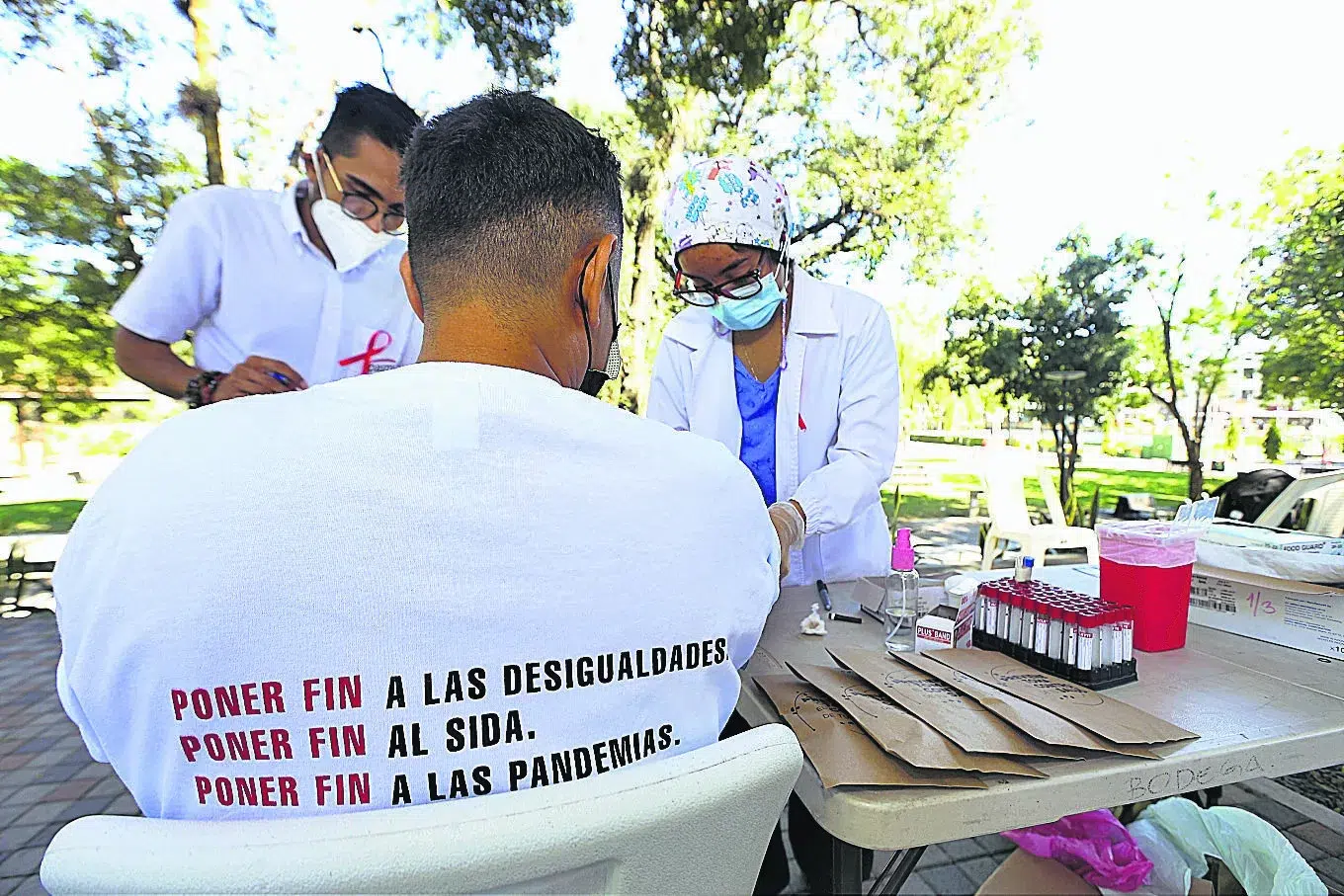The Medical Association of El Salvador (COLMEDES) warned on Tuesday that the withdrawal of educational material on the Human Immunodeficiency Virus (HIV) from public clinics is a “dangerous” measure, which could pose risks to the health of the entire Salvadoran population, not just LGBTIQ+ individuals.
“This is extremely dangerous. I read the news that they are going to remove this as a database and the truth is (…), when the population knows that there is a risk, (…) it collaborates in prevention measures. But if nobody knows anything (…), it is more about putting all the favorable factors for an outbreak or an epidemic,” said Dr. Carlos Ramos Hinds, vice president of COLMEDES, in an interview with YSUCA radio.
On Tuesday, February 28th, the Ministry of Health (MINSAL) ordered its personnel, via WhatsApp, to remove “all documents, forms, and educational material on sexual diversity” and deliver it to the offices of the Basic Integrated Health System (SIBASI) the following day.
The order, which responds to a crusade that the Government has undertaken against all material mentioning sexual diversity, included the Sentinel Surveillance Clinics and Control of Sexually Transmitted Infections (VICITS), where counseling and treatments were provided to the LGBTIQ+ population.
One of the removed forms was used to request or confirm HIV tests and to report pre-test counseling. In it, the patient’s sexual orientation and gender identity could be detailed.
Yesterday, Monday, the “Dr. Salvador Allende” Health Movement (ALAMES El Salvador) warned that, with this decision, the ministry has “dismantled” the HIV Epidemiological Surveillance System because it will no longer be possible to identify “the most vulnerable population segments, based on a scientific and evidence-based approach.”
The Expanded LGBTI+ Movement of El Salvador also reported that MINSAL and its SIBASI have suspended meetings with LGBTIQ+ collectives to monitor HIV. The World Health Organization (WHO) recognizes as key populations for HIV prevention two groups: transgender women and another consisting of gay men and men who have sex with other men.
COLMEDES’ President, Iván Solano Leiva, argued in an interview with YSUCA that all these measures will make “a person belonging to the LGTBIQ+ population not go to consultation due to discrimination or because they will not want to serve them. Then, it will cause damage to health, and this person can also be a source of contagion for other people.”
“All these implications have that kind of policy. It is regrettable, in that sense, that these decisions are being made,” he added.
Since news of the removal of educational material became known, LA PRENSA GRÁFICA sought the communications office of MINSAL to inquire about these measures and how they will influence care for HIV patients, but to date the institution has not responded.
Colegio Médico advierte de riesgos para la salud pública por retiro de material sobre VIH de las clínicas públicas de El Salvador
El Colegio Médico de El Salvador (COLMEDES) advirtió este martes que el retiro de material educativo sobre el Virus de Inmunodeficiencia Humano (VIH) de las clínicas públicas es una medida “peligrosa”, que puede significar riesgos para la salud de toda la población salvadoreña, no solo de las personas LGBTIQ+.
“Esto eso es peligrosísimo. Leí la noticia de que van a hacer desaparecer esta como base de datos y la verdad (…), cuando la población sabe que existe un riesgo, (…) colabora en las medidas de prevención. Pero si nadie sabe nada (…), es más poner todos los factores propicios para que exista un brote y o una epidemia”, dijo hoy el doctor Carlos Ramos Hinds, vicepresidente del COLMEDES, en una entrevista con la radio YSUCA.
El martes 28 de febrero, el Ministerio de Salud (MINSAL) ordenó a su personal, vía WhatsApp, retirar “todo documento, formulario, material educativo sobre diversidad sexual” y entregarlo a las oficinas del Sistema Básico de Salud Integral (SIBASI) al día siguiente.
La orden, que responde a una cruzada que ha emprendido el Gobierno contra todo material que mencione la diversidad sexual, incluyó a las clínicas de Vigilancia Centinela y Control de las Infecciones de Transmisión Sexual (VICITS), donde se brindaba consejería y tratamientos a la población LGBTIQ+.
Uno de los formularios eliminados se utilizaba para solicitar o confirmar pruebas de VIH y también para reportar consejería previa a la prueba. En él se podía detallar la orientación sexual e identidad de género del paciente.
Ayer lunes, el Movimiento por la Salud “Dr. Salvador Allende” (ALAMES El Salvador) advirtió que, con esta decisión, el ministerio ha “desmontado” el Sistema de Vigilancia Epidemiológica del VIH, porque ya no será posible “la identificación epidemiológica de los segmentos poblacionales más vulnerables, a partir de un enfoque científico y basado en evidencias”.
El Movimiento LGBTI+ Ampliado de El Salvador también informó que el MINSAL y su SIBASI han suspendido las reuniones que sostenían con colectivos de esta población para darle seguimiento al VIH. La Organización Mundial de la Salud (OMS) reconoce como poblaciones clave para la prevención de VIH a dos grupos: mujeres transgénero y el otro lo constituyen hombres gais y hombres que tienen relaciones sexuales con otros hombres.
El presidente del COLMEDES, Iván Solano Leiva, sostuvo en la entrevista con la YSUCA que todas estas medidas harán que “una persona que pertenezca a la población LGTBIQ+ no vaya a pasar consulta por la discriminación o porque no lo van a querer atender. Entonces, va a causarle daño a salud y esta persona también puede ser fuente de contagio de otras personas”.
“Todas esas implicaciones tiene ese tipo de políticas. Es lamentable, en ese sentido, que se estén tomando esas decisiones”, agregó.
Desde que se conoció el retiro del material educativo, LA PRENSA GRÁFICA buscó a la oficina de comunicaciones del MINSAL para consultar sobre estas medidas y cómo influirán en la atención para pacientes con VIH, pero hasta la fecha la institución no ha respondido.

